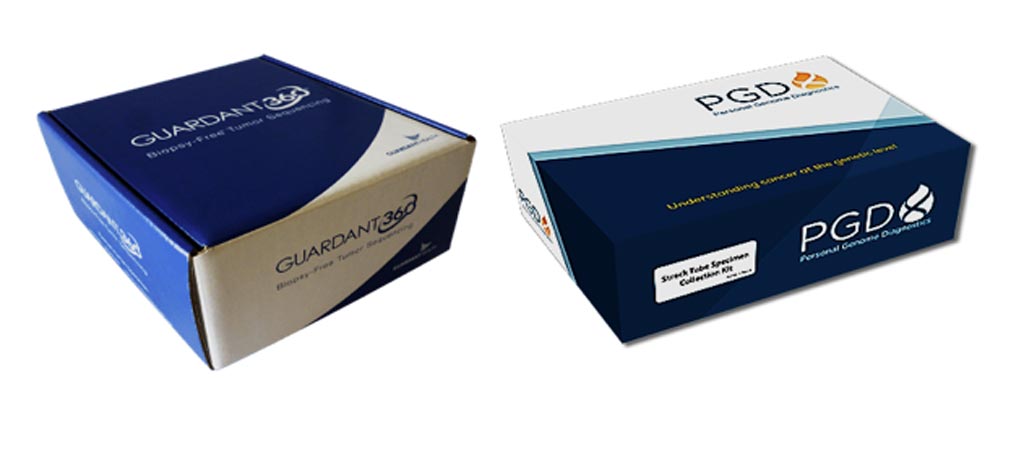Significant Disparities Found between Liquid Biopsy Providers
By LabMedica International staff writers
Posted on 26 Dec 2017
Liquid biopsy is a new and noninvasive alternative to tumor tissue sequencing, and it is intended to specifically detect and sequence tumor DNA circulating in patients' blood. The results are used to help guide doctors to tailor the best treatment for patients at each point of their disease.Posted on 26 Dec 2017
Patients may respond differently to cancer drugs depending on what kinds of gene mutations they have in their tumors. Oncologists use the results of a liquid biopsy to see if a patient is responding to treatment and to monitor tumors to see if they are progressing and may require a new or extra therapy. They may also use the results to select patients for clinical trials, if a specific mutation is found in their tumor's DNA.

Image: The Guardant360 kit for biopsy-free tissue sequencing for cancer and the PlasmaSelect 64 specimen collection kit (Photo courtesy of Guardant Health and Personal Genome Diagnostics).
Medical scientists at Johns Hopkins Medicine (Baltimore, MD, USA) collected blood samples from 40 metastatic prostate cancer patients from January 2007 and July 2017. The samples were shipped to two laboratories that were licensed by Clinical Laboratory Improvement Amendments, known as CLIA, and accredited by the College of American Pathologists, and report having high sensitivity (in this case, the ability to correctly identify mutations when they occur) and high specificity (the ability to correctly report as negative when those mutations are not present).
The two liquid biopsy panels compared were the Guardant360, which sequenced at least part of the coding sequences of 73 genes, and the PlasmaSELECT panel, which sequenced coding segments of 64 genes. The two companies differ in which genes, and regions within each gene, are covered. Just 25 of the 40 patients in the study had at least one genetic mutation reported within the overlapping genetic sequences covered by both companies.
The team found that even when the companies were analyzing DNA from the same blood drawn, their results rarely matched each other. When comparing results within the overlapping genetic sequences, the results from both companies completely matched for all the mutations reported in only 3/40 patients (7.5%) of cases. In 6/ 40of the patients (15%), both companies' results matched for at least one of the reported mutations. In 16/40 (40%) of the patients, no mutations reported that were potentially covered by both panels were detected by both companies.
Each commercial test costs about USD 4,000, and patients usually only have their samples sent to one laboratory for testing. Gonzalo Torga, MD, a postdoctoral research fellow and co-author of the study said, “Liquid biopsy is a promising technology, with an exceptional potential to impact our ability to treat patients, but it is a new technology that may need more time and experience to improve. We cannot tell from these studies which laboratory's panel is better, but we can say that certification for these laboratories must improve.” The authors want to make sure oncologists are aware of the inconsistencies so that they do not blindly trust liquid biopsy results. The study was published on December 14, 2017, in JAMA Oncology.
Related Links:
Johns Hopkins Medicine









 Analyzer.jpg)



